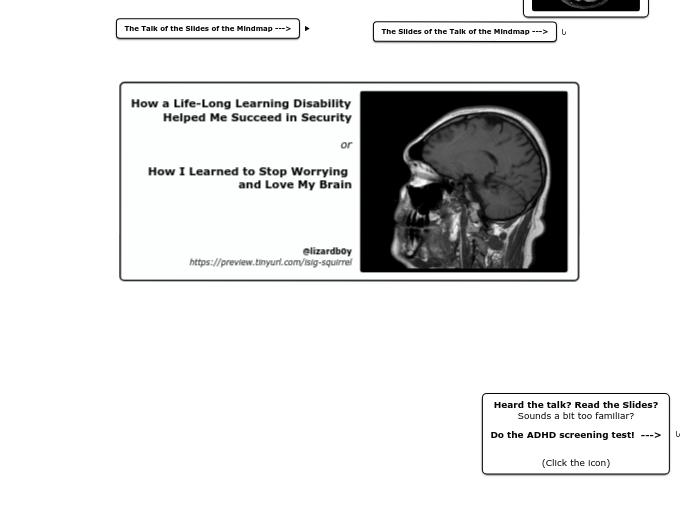How a Life-Long Learning Disability Helped Me Succeed in Security
or
How I Learned to Stop Worrying and Love My Brain
@lizardb0y
https://preview.tinyurl.com/isig-squirrel
Winning the ADHD Lottery
Y'all Know I'm not a Doctor
Right?
Attention Deficit Hyperactivity Disorder is an poorly named and poorly understood neurological disorder.
It affects between 5-6% of the adult population, and it is recognised that people with ADHD are over-represented in technical professions. Its symptoms are usually described in negative terms; distractibility, procrastination, impatience, poor time management and difficulty managing emotions.

I'd rather have a full bottle in front of me...
The prefrontal cortex is connected to and manages other parts of the brain responsible for things like emotions, attentional control and working memory. This is has bexcome collectively known as Executive Function.
It is currently believed that impaired pathways between the parts of prefrontal cortex and other parts of the brain cause the symptoms of ADHD.
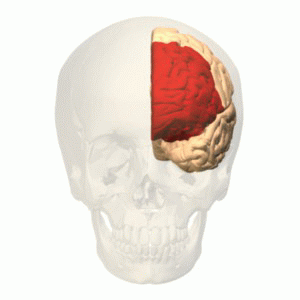
The 'What' pathway to the basal ganglia connects working memory. This is task memory, and guides our actions, plans, goals and thinking of the future.


The 'When' pathway to the cerebellum affects our perception of time and timing; when things happened, how much time has passed, sequencing our actions.
The 'Why' pathway links to the amygdialla, allowing us to manage emotions, wants and desires. This is the final arbiter of our behaviour.

The 'Who' pathway to the insular cortex and the anterior cingulate cortex manages our self-awareness. It's how we understand how we feel and what's happening to us.

It's the different combinations and level of impairment of these pathways that results in the cluster of symptoms that a person with ADHD experiences.
There are several other conditions often comorbid with ADHD, including:
- Dylexia
- Dyspraxia
- Auditory processing and other sensory disorders
- Depression and anxiety
We're all Unique Little Snowflakes
!! WARNING !!
This product contains massive over-generalisations, unfounded assumptions and conclusions from anecdote.
But there's some science there. Trust me.
!!! MOAH WARNING !!!
This product also contains pretty blunt descriptions of the experience of growing up with undiagnosed ADHD.
TL;DR It's not all jellybeans and farting rainbows.
My Story

Childhood
It's fair to say I had a bit of a reputation at school.
I got in trouble all the time. I wouldn't pay attention, or I'd do things we'd just been told not to do. Or wouldn't do what I should.
My teachers all told me I was really smart.
If only I'd apply myself.
Nek Minit
About 7 years ago my son was struggling in school.
He got in trouble all the time. He wouldn't pay attention, or he'd do things he'd just been told not to do. Or wouldn't do what he should.
His teachers said he was really smart.
They thought he needed help.

That's When I Learned
The biggest predictor of having ADHD is having a parent with ADHD.
The questions the doctors asked about about his behaviour.. well, they applied to me too.
Once my son had been diagnosed with ADHD I went to see if I might have it too.
Yippee!!1!1!!!
Everyone's a winner.
This Affects How We Experience The World
The following descriptions are recognised themes in clinical literature and case studies as well as my own conversations with other adults with ADHD. They describe my own lived experience and do not necessarily reflect anybody else's. It is nonetheless very likely that adults with ADHD will find some of this personally familiar.
The Symptom

Attention is random, not controlled
Sometimes we can't force our attention to focus on we want. Sometimes we can't force it away. That's called Hyperfocus.
"Because it has to be done" is not a motivator.
"Because it's the right thing to do" is not a motivator.
Is it fun? Will I die if I don't?
So we focus on what we're interested in, the things that give us immediate reward, and the things that will have immediate dire consequences.

Effort is no predictor of success
Ability is no predictor of success. We learn that failure is the default and success is random. Telling me to try harder makes me hate you. I'm already trying as hard as I can.
So we learn to be independant, to question authority. We never ask for help. We brutally force ourselves to solve it ourselves.
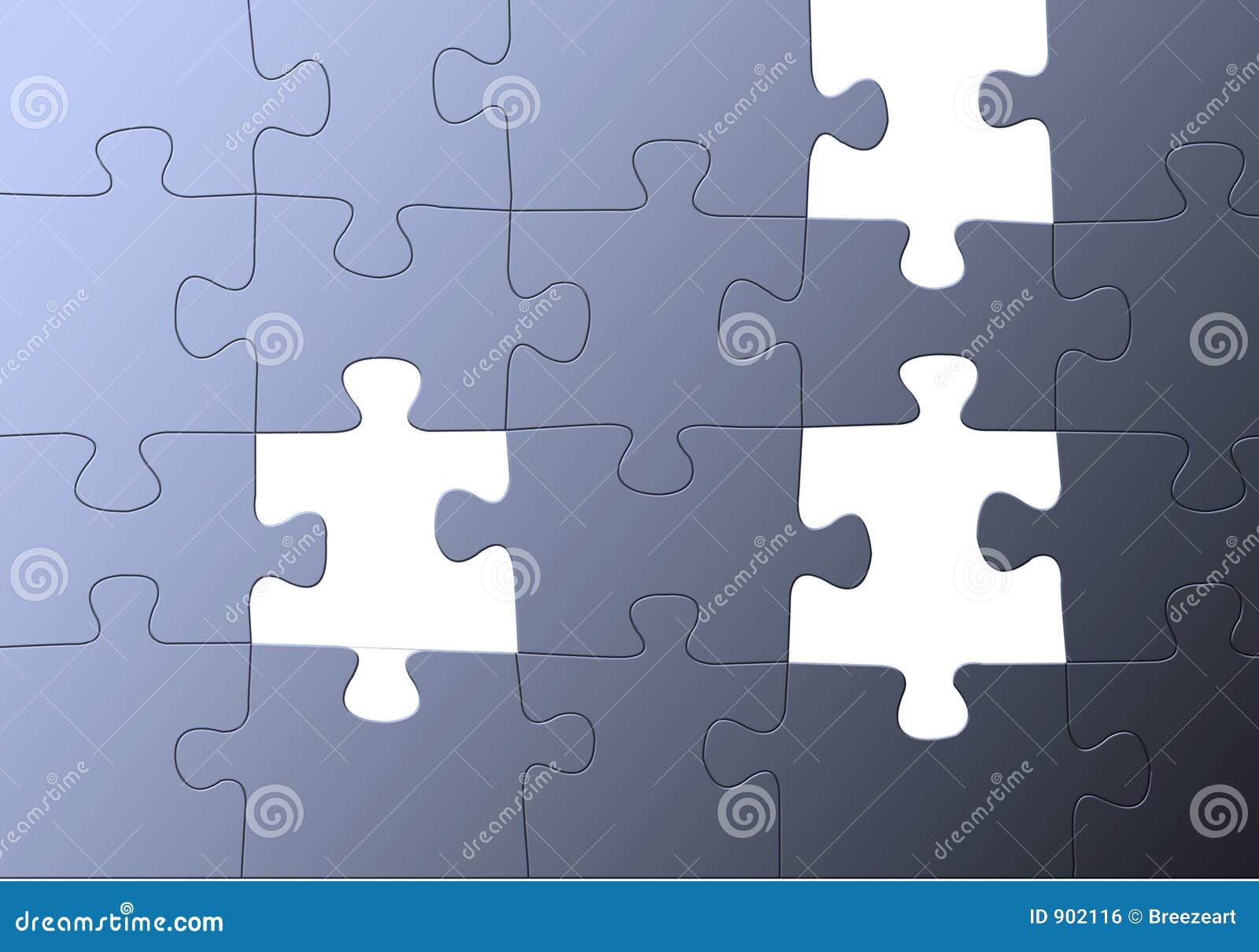
We miss bits of what's going on
What you just said? I only got 3 words of that. But I'm not rude. I do care what you say.
So we learn to fill in the gaps from other available context. We learn to intuitively connect related things and to uncover meaning.

We remember lots, but we can't recall it on demand
We often struggle to recall something even though we know we know it. Often memories just float outside our sphere of relevance and dissapear.
But then we notice something that somehow triggers that lost memory to flood back in glorious technicolour! Unfortunately the trigger is the empty fridge, the memory is yesterday's plan to pick up milk on the way home, and now we not only feel like crap, but we have to skip breakfast.
The Adaptation
When we're engaged, we dive deep
Our attention is held by things that are novel or interesting. When we find something new that catches our interest we often hyperfocus on it. Our interest in it can be all absorbing; we read everything we can find on the topic, we try things out we want to learn everything.
At some point the novelty wears off. Something else catches our interest... NEW HYPERFOCUS!!
Many people with ADHD have deep understanding across many domains.

We don't just think "outside the box." There is no box
Because of our childhood experience of getting in trouble seemingly randomly, we don't automatically respect authority, or accept the received wisdom. We don't really care how things are done "around here" if it doesn't seem to be working. And yes, we can be a bit abrasive sometimes, but impulsivity means we're very likely to speak our minds.

We See Dead P Patterns and Relationships
Spending a life piecing our understanding of the world togther from fragments of context and broken conversations leads to an ability to perceive complex patterns and relationships that most people just can't see.
This is something that has been noted by several leading ADHD researchers from clinical observation.

Hang on.. That Reminds Me..
So you're sitting in that meeting about that thing, and you're feeling like everyone's just talking and going nowhere. Suddenly a few words pierce your foggy reverie and a connection hits you out of the blue - there was this article I read last.. month? .. year?.. but anyway; its connected, and it helps us solve this impasse.
Seriously this is a thing.
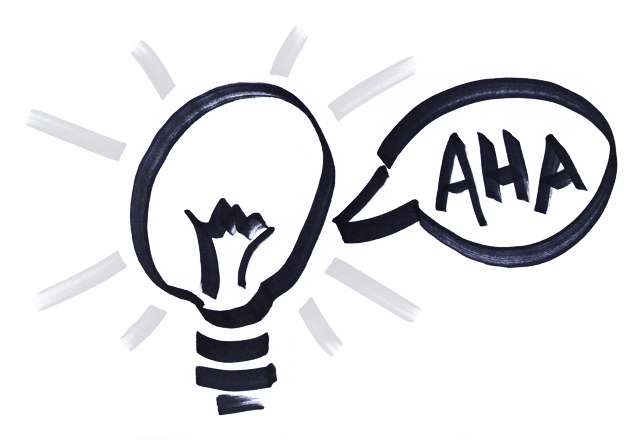
None of this truly compensates for the awful reality of living with ADHD
But I really do think that I'm good at what I do today partly because of the skills I've had to learn for coping with ADHD.
That said, what I do today is a bit mad
I have a view of secutity shaped by psychology, behavioural economics and blind, relentless humanism
A lot of my work is identifying themes and patterns in complex systems*
- Hidden goals, objectives, motivations, expectations
- The anti-patterns and broken processes that lead to problems
I do this by basically feeding huge amounts of information into my brain and waiting for useful insights to fall out.
(The problem is seldom technology
And the solution never is)
The Talk of the Slides of the Mindmap --->
The Slides of the Talk of the Mindmap --->
Creativity
There's been recent research finding correlation between ADHD is heightened creativity. This is a whole other area of psychology that I'd love to get into, but let's do it another time.
Current thinking on creativity and innovation is that the best (maybe only) way to innovate is to:
a. Bring in knowledge from other domains
b. Stop doing something you do now and look for alternatives.
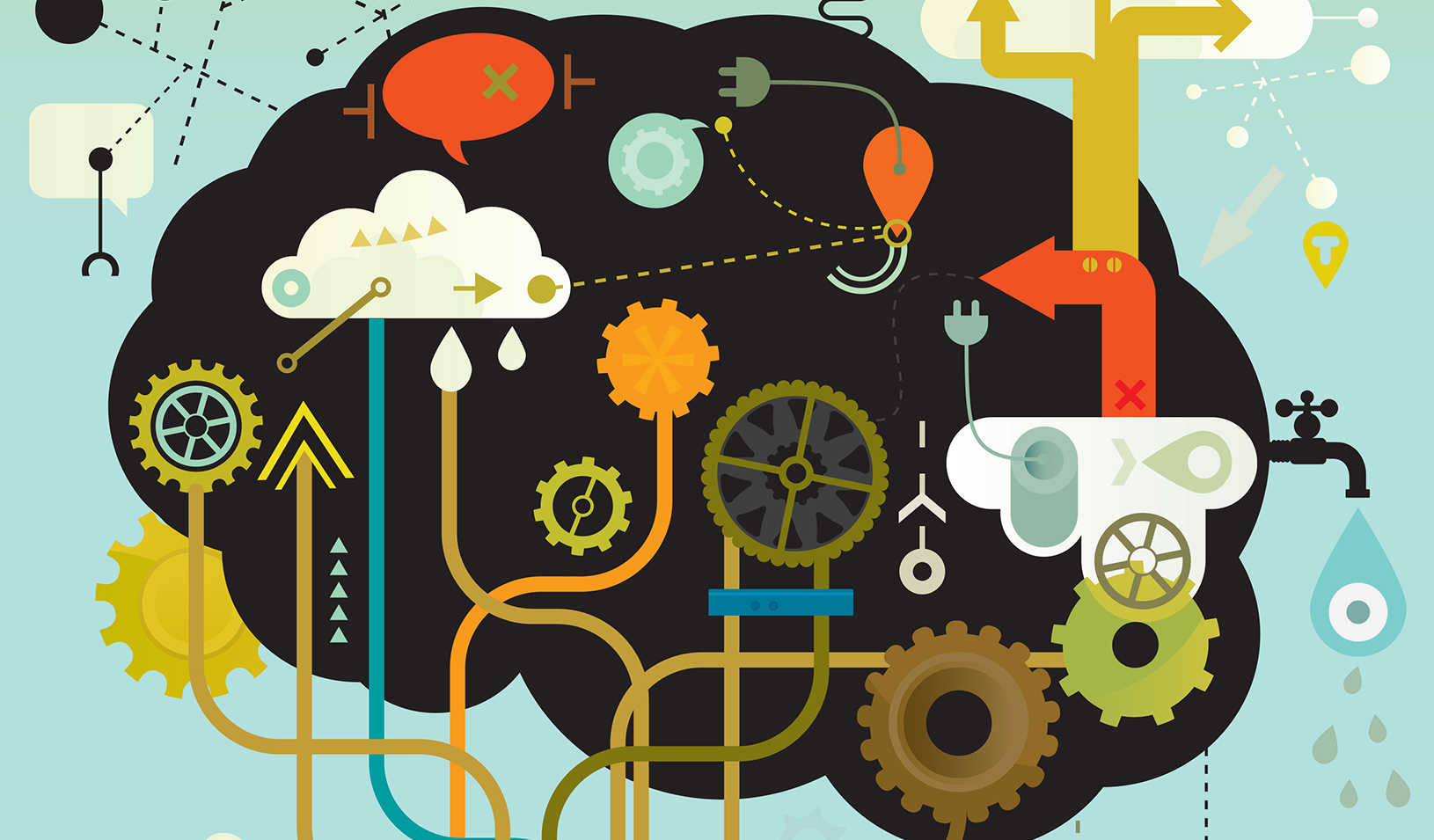
Creativity from Constraints
The Real Neuroscience of Creativity

Fun Fact!
Psychologists call this
Oppositional
Defiance
Disorder

The combination of unmanaged attention and unpredictable outcomes fundamentally breaks the causal relationship between intent, effort, and outcome.
"Yesterday I paid attention as hard as I could, made a huge effort to do what the teacher said and I was praised. Today I paid attention as hard as I could, made a huge effort to do what the teacher said, and I got told off. I am told that it was different today than yesterday, but I don't know how and they keep telling me I should know."
Its not just about getting yelled at, its's everything; breaking things, losing things, losing friends, missing out. Adults tell me there's a pattern. I have to work out the pattern.
Every decision, every moment of my life, I have to work out what could go wrong.
Prefrontal Cortex and Executive Function
What is Executive Function? 7 Deficits Tied to ADHD
Characterising cognition in ADHD: beyond executive dysfunction
A review of Heterogeneity in Attention Deficit/Hyperactivity Disorder (ADHD)
Flow State
“A state in which people are so involved in an activity that nothing else seems to matter; the experience is so enjoyable that people will continue to do it even at great cost, for the sheer sake of doing it.”
Mihaly Csikszentmihalyi, Flow: The psychology of optimal experience

Common ADHD Comobidities
Dyslexia, dyspraxia and ADHD in Adults
Comorbidity of Central Auditory Processing Disorder and Attention-Deficit Hyperactivity Disorder
Characterising cognition in ADHD; Beyond Executive Function
Comobidity of Attention Deficit Hyperactivity Disorder With Conduct, Depressive, Anxiety and Other Disorders
ADHD Comorbidity Findings From the MTA Study: Comparing Comobid Subgroups
The Gift of ADHD?
I think it's lovely that some people find it helps to see their ADHD as a gift. I really hope it helps them experience their life in more healthy and sucessful ways.
It's bullshit though.
*system ( /ˈsɪstəm/ ), noun
a set of principles or procedures according to which something is done; an organized scheme or method.
"a multiparty system of government"
BONUS ROUND!
Spot the Deliberate Mistake
complex
The complex domain represents the "unknown unknowns". Cause and effect can only be deduced in retrospect, and there are no right answers. "Instructive patterns ... can emerge," write Snowden and Boone, "if the leader conducts experiments that are safe to fail." Cynefin calls this process "probe–sense–respond".

The Cynefin Framework
Complexity Theory and Organisations

